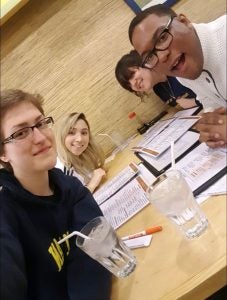First-generation students face a unique set of obstacles upon enrolling at the University of Michigan. Navigating the academy in measurably different ways than their continuing generation peers, first-generation students at Michigan typically take longer to graduate, graduate with lower GPAs, and have higher attrition rates than their continuing generation counterparts. Moreover, first-generation students typically exhibit weak academic preparation, weaker study skills, less extracurricular involvement, and so on. They typically have more difficulty navigating college bureaucracy and experience more family strains, insufficient familial support, and smaller support networks. Although there are many reasons for these outcomes, one under-studied aspect of the first-generation college experience is that of family life. The SOUL project seeks to understand the unique combination of academic, financial, and social challenges confronting first-generation students and their families. From this point on, we will be building on the data we have thus far collected on students and be extending our focus onto their parents and/or guardians.
We met our goal to understand the unique combination of academic, financial, and social challenges confronting first-generation students and their families through our interviews. We also interviewed twenty first-generation college student participants studying in the Department of Sociology. Our work is now feeding into our Capstone project Serving the First: A New Generation through the Barger Leadership Institute. The goal is to inform university policy and design intervention programs to improve the academic, financial, and social integration of first-generation students and their families at the University of Michigan and other elite institutions. Very little is known of first-generation students and their families. This study will generate original publications and research.
We experienced challenges recruiting the interviewees at first due to low response rate and timing with exams but after a few weeks, we were able to recruit twenty interview participants. We reached our goal of twenty interview participants by constantly reaching out through email and leveraging our own networks on campus.
The SOUL program engaged the world by exploring and gathering information on the needs of first-generation college students and acting on this information in the form of interventions. There has not been much work done to alleviate the transition

to college of first-generation college families; so our research built on the work being done at our university and possibly on other campuses. The interview process was the initial engagement of a population that is not always best supported. We grew as leaders by taking the first step.The university community is comprised of numerous different people with numerous backgrounds. The SOUL programs aims to value the difference amongst people by placing a supportive focus on first-generation college students. Through the interviews, we gained invaluable knowledge that goes into how a large population of the students navigate their collegiate experience and how parents can be better incorporated into that if possible. We grew as leaders by valuing difference.
Ultimately, the SOUL program conducts research and interviews to learn from the accounts of first-generation college students and their families. A productive relationship between these unique families and students will be formed gradually by the further involvement of this program. The information gathered will be shared with the university community to achieve the goal of a better educational experience for all. As leaders, we will always work to learn.
By: Lance Bitner-Laird



